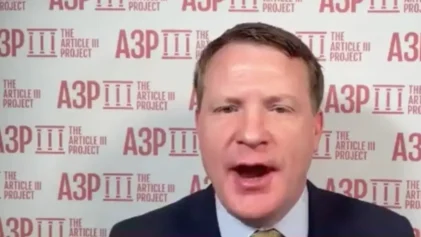A new federal lawsuit filed by a Black Vietnam War veteran alleges the Department of Veterans Affairs has a decades-long pattern of racial bias in denying benefits to African-Americans who served in the U.S. Armed Forces.
The lawsuit filed on Monday, Nov. 28, by the Yale Law School’s Veterans Legal Services Clinic on behalf of Conley Monk Jr. under the Federal Tort Claims Act seeks relief from the VA for negligence, negligent infliction of emotional distress, and negligent supervision, and comes after the agency failed to respond to Monk’s administrative claim filed in February.
Last year, Monk, a 74-year-old former Marine from Connecticut and co-founder and director of the National Veterans Council for Legal Redress (NVCLR) and the Black Veterans Project (BVP), obtained records via a public records request that sought race-specific data on the VA’s disability compensation claim determinations.

The veteran’s advocate and his attorneys were provided records covering the years 2001 to 2020, and they say the data proves the VA systematically discriminated against Black veterans.
The complaint says the allocation of benefits was done in a racially discriminatory manner for years, disproportionately rejecting Black veteran disability claims at a much higher rate than those of white veterans.
According to the complaint, the VA failed to fully respond to requests for aid until 2021, when the NVCLR and BVP filed a complaint in a U.S. district court. Only after that did the VA disclose data for claims from 2001 to 2020. It also was discovered the VA did not fully retain disability decision data prior to 2001, thus the discrimination could have extended even further back.
The VA records were later analyzed by a Yale University statistician who found over those two decades, the government denied 29.5 percent of Black veterans’ disability compensation applications, while white veterans were denied at a rate of 24.2 percent.
The Yale analysis also showed that Black veterans’ disability compensation rate was 30.3 percent, while their white counterparts’ rate was 37.1 percent.
Monk, a Vietnam War vet, said he is ready to “get involved in this fight.”
“This is something that’s not only going to benefit me,” the activist said. “But it’s going to benefit other veterans. And if I have to lead the charge, then therefore I will lead the charge.”
At stake is the determination of how liable the federal government is to this seemingly systemic injustice. It will attempt to show the court how generations of families may have been compromised and unduly burdened with the medical care of their loved ones because of racial bias interwoven in the processing method, the Washington Post reports.
“The negligence of VA leadership, and their failure to train, supervise, monitor, and instruct agency officials to take steps to identify and correct racial disparities, led to systematic benefits obstruction for Black veterans,” the lawsuit says. “VA leaders knew or should have known and negligently failed to redress.”
Monk’s complaint describes how he enlisted in the Marines in 1968 at the height of the Vietnam War and served in that conflict zone in a troop transport role from July 1969 until November 1969, when his unit was temporarily transferred to Okinawa, Japan. Fresh from the war zone, he had a couple of fights in Okinawa and was put in a prison on base.
His federal complaint describes what happened next:
“Mr. Monk was told that he would stay in base prison until he signed papers agreeing to an Undesirable discharge and waiving his right to a court-martial. Mr. Monk did not understand that by accepting an Undesirable discharge, he would not only forfeit his eligibility for medical care and other financial support and benefits for veterans but also face a lifetime of stigma. Depressed and symptomatic with PTSD, Mr. Monk signed the discharge papers.”
For decades after his discharge from the Marines in 1970, not only were Monk’s disability claims rejected, but so were applications for health care, education assistance, and home loans. Only in 2015, by which time he had obtained the assistance of the Veterans Legal Services Clinic and gotten his discharge status changed through a separate agency, did the VA grant him benefits.
The lawsuit against the VA does not seek to reopen the case of any specific benefits request Monk has made. Instead, he “seeks to recover for the harm caused to him by VA leaders’ negligent failure to redress the longstanding racial disparities in veterans’ benefits administration,” his complaint states.
In a statement, VA Press Secretary Terrence Hayes, a Black Army veteran, acknowledged that Black veterans have been historically slighted when it came down to access to VA care or benefits and flatly blamed it on “racism.”
“Throughout history, there have been unacceptable disparities in both VA benefits decisions and military discharge status due to racism, which have wrongly left Black veterans without access to VA care and benefits,” the statement said.
He wrote, “We are actively working to right these wrongs, and we will stop at nothing to ensure that all Black Veterans get the VA services they have earned and deserve.”
These statements come after the release of another study conducted by the Connecticut Veterans Legal Center titled “How Racial Disparities in the Military’s Administrative Separation System Harm Black Veterans,” which binds both Monk’s petition and what Hayes admits is a shameful truth.
It revealed that while joining the military has traditionally allowed Americans to access the middle class, economic security, and a better life, oftentimes for Blacks that is not a reality.
“Publicly funded benefits of military service have enriched white veterans throughout history far more than veterans of color,” the study states. “The population-level analysis in this report demonstrates the existence of persistent racial disparities in the administrative separation system. The data show that Black veterans are much more likely than white veterans to bear the stigma of a less than honorable discharge.”
Adding, “Accordingly, Black veterans make up a disproportionate share of those former service members whom VA presumptively excludes from VA benefits.”
“Lack of access to benefits leaves veterans at higher risk for poverty, homelessness, and suicide and can foreclose the pathway to economic stability. The effects go beyond economic stability and healthcare to create a racial disparity in how much honor, respect, and dignity our society offers its veterans of color and their descendants,” a summary of the research explains.


